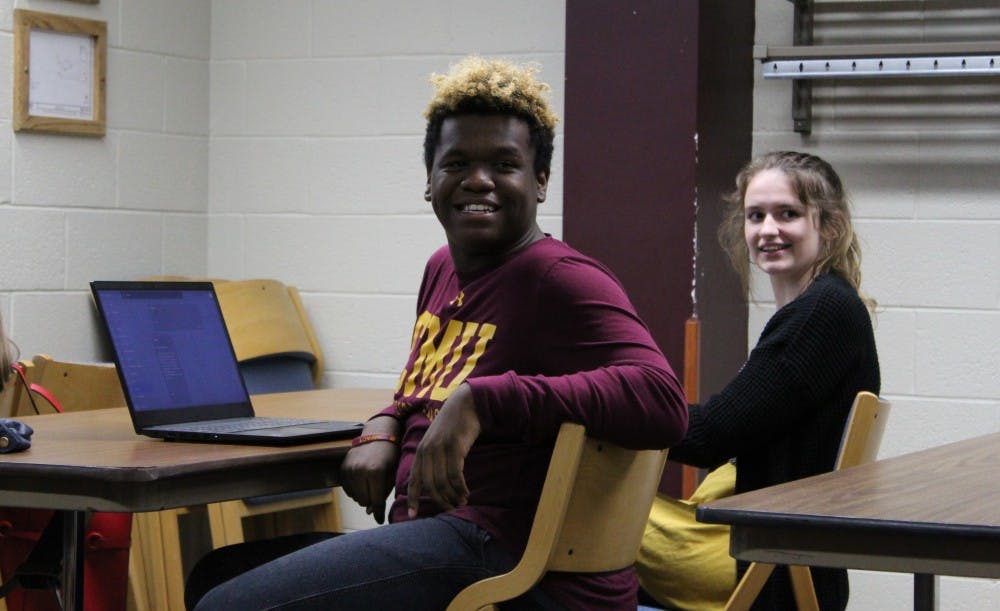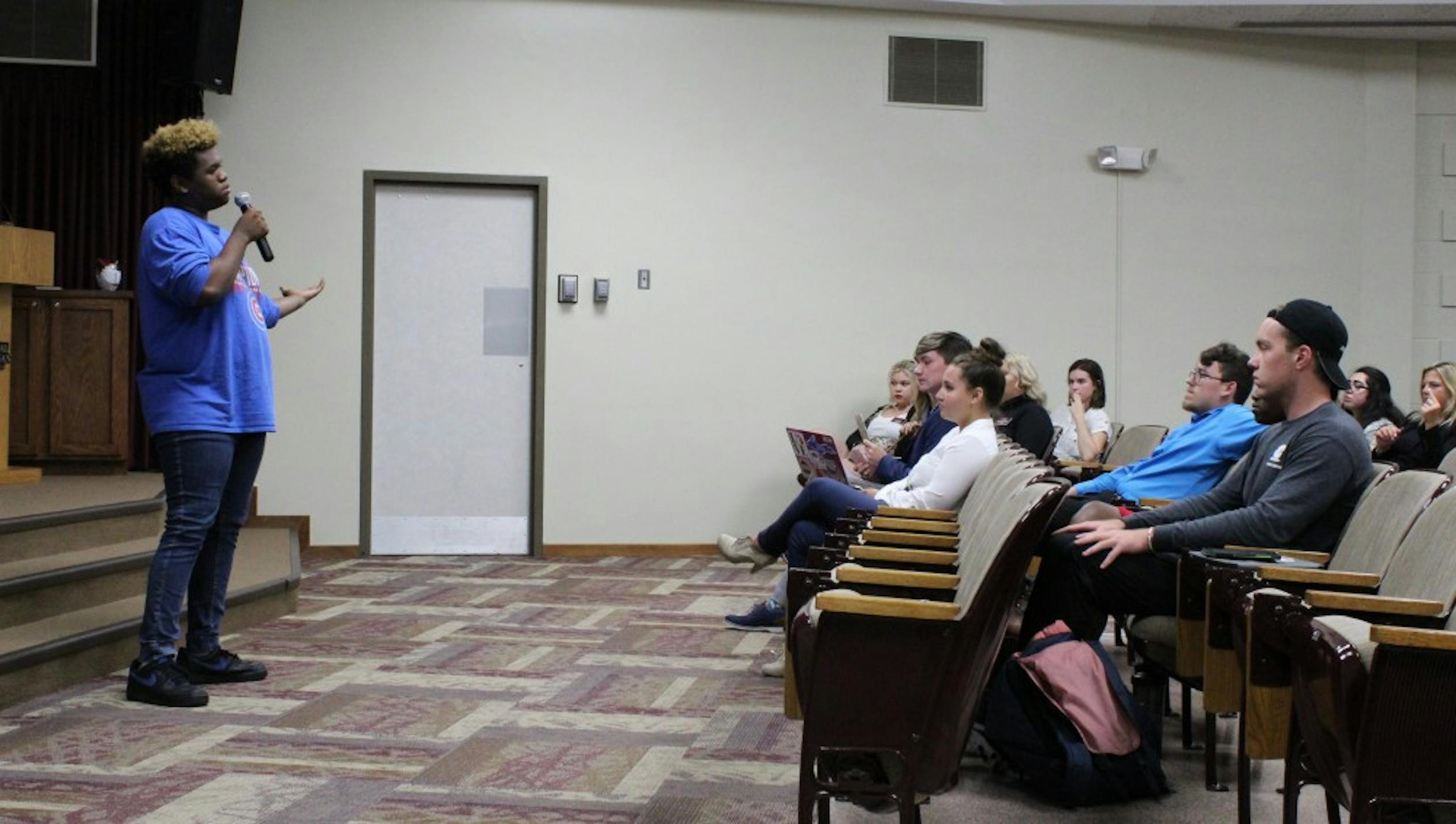SGA senator Caleob Mitchell shares history of firing students up for change

Chicago freshman Caleob Mitchell and Muskegon sophomore Taylor Dibble smile during a meeting of the SGA senate, Monday, Sept. 30, 2019.
Chicago freshman Caleob Mitchell was elected to the senate of Central Michigan University’s Student Government Association and as Cobb Hall president this year, but channeling the voices of his fellow students to create change is nothing new to him.
During his junior year of high school, Mitchell organized a walkout against gun violence. He and about 200 students stopped traffic on 47th Street for about 10 minutes.
But it was after his high school’s governing body, the Local School Council, voted not to renew principal David Narain’s contract at a little-publicized meeting his junior year that Mitchell felt he had to respond. That's when he got a real taste for organized action.
Mitchell is a graduate of Dr. Martin Luther King Jr. College Preparatory High School, also known as King College Prep, located on the south side of Chicago – a “very, very black and very poor” area where he said many live paycheck to paycheck. King College Prep is one of Chicago’s 11 selective enrollment high schools, where well-performing middle school students can get a leg up on students from other, less-resourced schools.
Mitchell, who is now openly gay, lived in a homophobic environment with his father and his father’s parents from seventh grade until the beginning of his junior year, when he ran away to live with his mother. His grandfather told him that he would rather "have a murderer, a thief and a rapist for a grandchild than a homosexual." Principal Narain was “like a father” to Mitchell, who would frequently go to him and the assistant principal for emotional support.
“Every day I would go to their office and just talk, cry, laugh,” Mitchell said. “I really needed that, because I was in a very dark place. They were the lights that kept me going and kept me confident in myself and my ability, and losing them was tough.”
Narain was replaced by Melanie Beatty-Sevier, the former principal of now-closed Paul Robeson High School. Mitchell said Paul Robeson High School was known to be a poor-performing public school and that many had doubts about how a principal who couldn’t turn Robeson around would be able to adapt to a selective enrollment environment.
Beatty-Sevier turned heads before her first year as principal – Mitchell's senior year – when she suggested that students not be allowed to dress “provocatively” to reduce sexual abuse. Mitchell said he “couldn’t allow someone like that to be responsible over growing adults.”
As Narain served the remainder of Mitchell’s junior year as principal, Mitchell organized two sit-ins with other student leaders, including a student representative on the Local School Council, to protest the decisions that were beginning to rupture the school’s culture. Over 100 students met in the foyer of King College Prep to insist on having a “stake in [their] own education.”
One of Beatty-Sevier’s most controversial moves as principal was to suddenly relocate a “media center” many students, including Mitchell, flocked to after school as a safe haven from turbulent home lives and to receive extra help with their classwork. The new room was smaller, had fewer resources such as books, computers and printers, and closed almost immediately after the school day was over.
Beatty-Sevier’s administration also triggered an “outpour” of faculty, Mitchell said, including the resignation of his debate coach.
Mitchell said he saw parallels between Beatty-Sevier’s administration and the home lives of many King College Prep students, including his own.
“Black parental culture is very much ‘you do what I say, when I say it, as I say it,’” Mitchell said. “There is no ‘I have an opinion,’ there is no ‘I have rights,’ there is no debate… I see the effects it’s having on students where they feel like they don’t have a voice.”
Mitchell and other leaders continued staging sit-ins. Beatty-Sevier’s response was reportedly marked by fear tactics, such as threats of expulsion and of placing scholarships in jeopardy, and at least once involved calling police to the school.
Above: Caleob Mitchell confronts Melanie Beatty-Sevier about students being barred from staying after school during a sit-in at King College Prep.
The sit-ins were “extremely” productive in building student morale and consciousness, Mitchell said. But when one of them led to a private meeting with the administration, the only tangible result was the removal of a velvet rope blocking off the principal’s office.
After less than a year as principal of King College Prep, Beatty-Sevier was assigned to another school in March 2019 following repeated complaints by parents and students to Chicago Public Schools and heightened news coverage which finally forced them to respond. Mitchell said he believes the sit-ins he helped organize played a “key role” in spurring on the change that was needed at King College Prep.
On campus, looking forward
Mitchell said in his SGA senate election speech that he wants to occupy positions of power to open lines of communication between minority populations and the institutions that govern them. He also wants to make sure what happened at King College Prep’s Local School Council won’t repeat itself at SGA.
“I want to hold SGA accountable,” Mitchell said. “I want to hold us to a standard of making sure that we’re transparent because I know what it’s like to be one of those people that’s not in the room when the decision’s being made, but wanting to see that process.”

As president of Cobb Hall, he’s been working with residence hall director Alància Crossley on revisions to Cobb Hall’s constitution.
Mitchell is aiming to making vague language clearer and easing transitions of power. One of his suggestions is to create templates for agendas and meetings to encourage students to run for office, even if they are unfamiliar with meeting procedure.
Crossley said the measures are “still getting off the ground,” but Mitchell has distinguished himself as someone who seeks opportunities to be part of positive change.
Pursuing a double major in psychology and political science with a double minor in applied statistics and leadership, Mitchell plans on knocking out both his undergraduate and graduate-level education at Central Michigan University, after which he’ll return to Chicago “as soon as possible and start building.”
“I’ve always been really politically conscious and engaged, so I always knew I wanted to do something in politics, but I’m also a very sensitive and emotional human,” Mitchell said. He has a passion for talking to people and sees psychology as an outlet for his interpersonal skills.
He dreams of consulting businesses and government agencies on workplace psychology, and of running for office in Chicago as an alderman, 50 of whom comprise Chicago’s City Council.
For the time being, though, Mitchell is a proud Chippewa who believes he is “strong enough” to bring every voice to the table.
“Coming from a school where our school pride was suppressed because students didn’t feel valued, [student pride] was the selling point for me,” Mitchell said of his decision to attend CMU. “I want to be a part of a community. I want to be a part of somewhere where people are proud to carry the Chippewa badge.”






